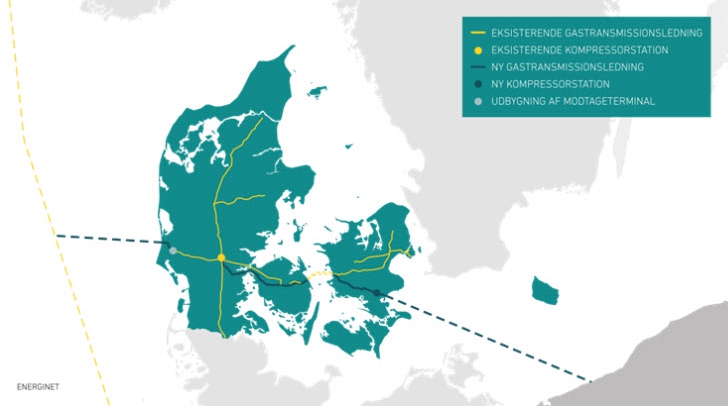Baltic Pipe Seeks Danish Minister's OK
Danish energy grids operator Energinet said March 19 that its supervisory board has approved the business case for the Danish part of the Baltic Pipe gas pipeline project, and that therefore the company will now submit an application to the Danish government for investment.
The investment requires approval by Denmark's minister of energy, utilities and climate Lars Christian Lilleholt, as Energinet is a state-owned company.
Baltic Pipe is a possible new gas pipeline connecting the existing Norwegian gas network in the North Sea with the Danish and Polish gas transmission networks, said Energinet. It will be a new pipeline in the North Sea linking the Norwegian Europipe II pipeline to Nybro, onshore western Jutland. According to the proposal, a new underground pipeline with a length of 220 km will be dug across Denmark, and a new submarine gas pipeline will be laid across the Baltic Sea to Poland. Energinet will be responsible for pipes in the North Sea, the new pipes across the Danish regions of Jutland, Funen and Zealand as well as a compressor station on Zealand. Its Polish state-owned counterpart Gaz-System will be responsible for subsea pipes in the Baltic Sea and new gas facilities in Poland.
"The Baltic Pipe will benefit both Denmark and Poland. One of the benefits for Denmark will be a tariff reduction for gas consumers of between Danish krone 1.9bn and 2.9bn [$313mn-$478mn]. A new pipeline link will also strengthen security of supply and result in sharper competition on the European gas market. We are therefore now submitting an application for investment approval to the Minister," said Energinet chairman Lars Barfoed. Provided the minister approves the investment, Energinet expects to make its final investment decision on the Baltic Pipe project, together with Gaz-System, towards the end of 2018.
Annual gas volumes transported in the Danish section of Baltic Pipe may reach 10bn m3/yr, said Energinet, while current Danish gas consumption amounts is roughly 2.5bn m3/yr.
Energinet asserts that Baltic Pipe will be an extra source of supply, increase security of supply for Danish consumers post-2022, and also spread the cost of operating its gas transmission network among more suppliers. It said that Baltic Pipe will mean that tariffs for companies and households will not increase in the future, during a time of declining Danish gas consumption which would otherwise necessitate tariff costs for individual customers. It added that a new cross-border link should also sharpen competition on the European gas market, and notes that Poland wants the new gas supply source, so that gas can replace coal in Polish power stations, and thus curb the country's greenhouse gas emissions.
Polish Gaz-System CEO Tomasz Stepien said earlier this month: “We believe that the construction of the Baltic Pipe will strengthen this trend even further by enhancing the stability and security of supply."
Gas companies, including Polish state-run PGNiG, have subsequently signed 15-year contracts on gas transmission from Norway to Poland, following a Baltic Pipe open season that was held last year.
The Danish part of the Baltic Pipe project will cost approximately krone 6bn [$990mn] and is expected to generate a socioeconomic profit. Energinet calculates the current value of the tariff reductions at krone 1.9-2.9bn, corresponding to a return on investment of 4.3% to 4.8% per year adjusted for inflation. It expects this to correspond to a tariff reduction for a typical household with a gas-fired boiler of krone 100-125 [$16.50-$20.62] per year, and for a company consuming 0.3mn m3/yr it expects the tariff reduction to be krone 15,000-19,000 per year.
Denmark’s foreign ministry must now vet new pipeline projects passing through its exclusive economic zone on foreign policy, defence and security grounds, including Baltic Pipe. However the first such vetting decision is due for the Nord Stream 2 project that would carry an extra 55bn m3/yr gas from Russia to northeast Germany; on March 15 the foreign ministry in Copenhagen declined to indicate to NGW when it will take that decision.

Baltic Pipe map, as it passes through Danish territory (Map credit: Energinet)



